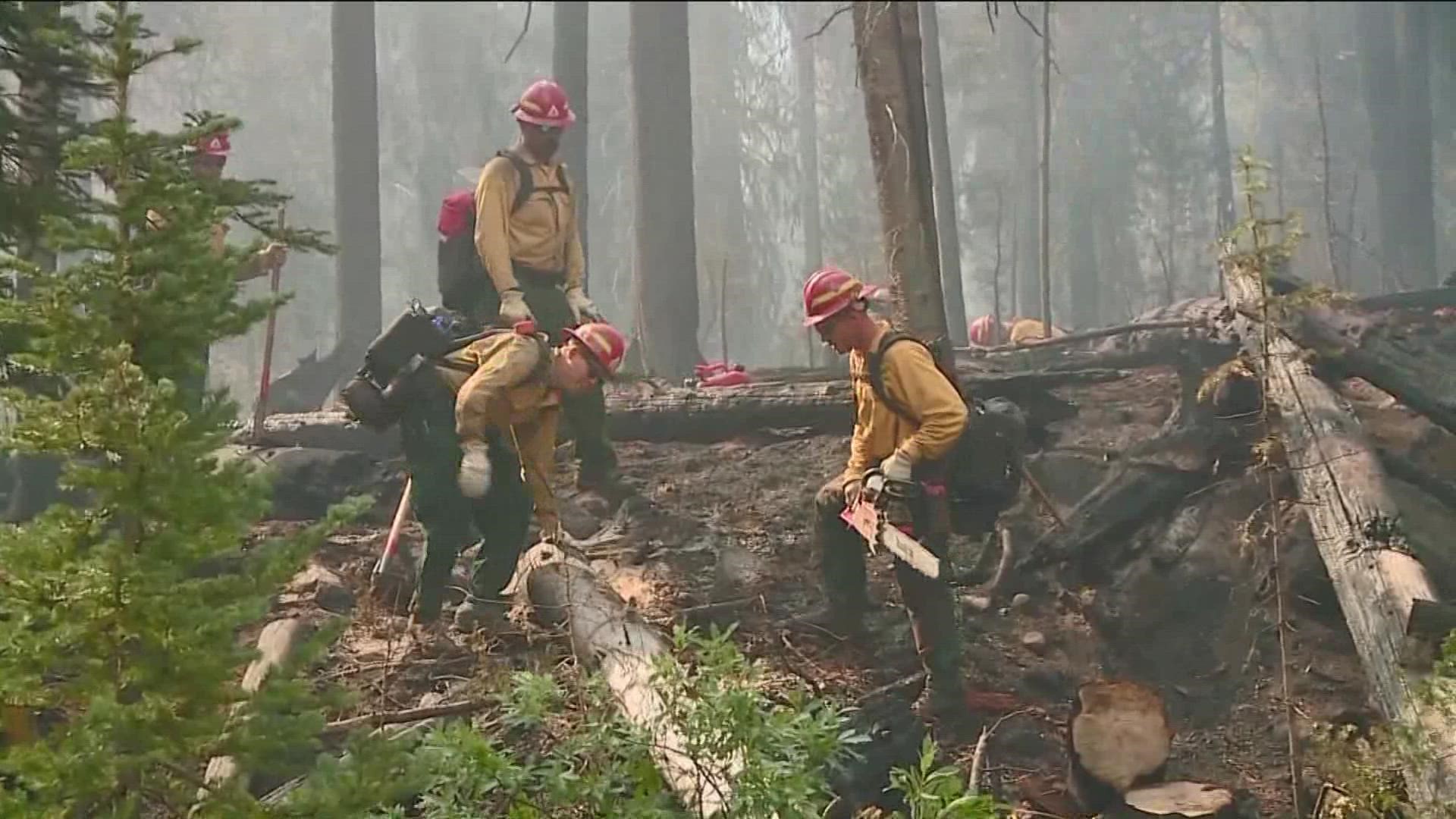BOISE, Idaho — After the past week's multiple wildfires burning in the state, it is clear, Idaho, much like the rest of the U.S., is officially in fire season. Agencies, like the National Interagency Fire Center (NIFC), have warned that fire seasons are becoming a thing of the past and what the country is seeing are "year-round events" because fires are starting earlier and lasting longer.
Congress passed the Bipartisan Infrastructure Law in late 2021, which funds $8.25 billion for wildland fire management around the country. A considerable amount of that money is designated for federal wildland firefighter pay increases and will turn many seasonal jobs into full-time positions for the longer fire seasons.
NIFC spokesperson Jessica Gardetto said the goal is to help improve their way of life, while also recruiting and retaining more wildland firefighters.
Gardetto said federal agencies will not begin to see the staffing effects of law until next fire season because they do most of their hiring in the fall which was around the same time Congress passed the law. She said leadership does believe the law will certainly entice new and former wildland firefighters to join crews in 2023.
"The Bipartisan Infrastructure Law is going to help us by allowing us to offer better work-life balance," Gardetto said.
The law ensures actions such as increasing wildland firefighters' starting pay to $15 per hour, increases to pay for current firefighters, which more than 11,300 firefighters have already seen, and expanding the number of wildland firefighters they are able to hire each season. Gardetto said adding more firefighters to crews means more staff is able to take more time off and vacations during the season.
"We do know that in some areas of the country, they've had some issues with hiring wildland firefighters, especially in places like Boise where housing has become incredibly expensive," Gardetto said.
The U.S. also added $103 million this year for wildfire risk reduction and burned-area rehabilitation throughout the country as well as establishing an interagency wildland firefighter health and well-being program. Gardetto said the increased mental health resources for crews will give firefighters support and training to handle stressful and traumatic situations, especially for those who are far away from family and loved ones.
"These Critical Incident Stress teams and mental health support are important not only for recruitment but for retention and being able to give firefighters the support they need to have a meaningful well-balanced career," Gardetto said.
Last Fall, NIFC hired 16,900 firefighters for agencies across the country for this fire season, which Gardetto said is about the same number as 2021. She said while they could use more staffing for these lengthier and more severe wildland fires, NIFC expects to see the number of firefighters applying and the number they hire for next season will increase because of the law.
"We've had a lot of people contact us interested in firefighting positions," Gardetto said. "We work to recruit firefighters in the Fall and into the Winter months so that we can hire them, train them, and have them ready for when we start experiencing fire activity in the Spring."
While this law addresses the current need for retention and recruitment, Gardetto said it does not provide long-term pay increases. According to the White House fact sheet, the funding will last for the next two fiscal years. NIFC hopes to address Congress on more solutions for the topic in the future.
The action from federal agencies has prompted the State of Idaho to do the same.
"Given the extreme nature of the 2021 fire season, Idaho Department of Labor (IDL) knew that we had to step up our game for firefighter recruitment and retention," said Scott Phillips, the policy and communication chief for IDL.
In the 2022 legislative session, Governor Brad Little signed a law that increased incentives and pay for state wildland firefighters.
IDL increased starting wages to $15, introduced hazard pay to the state, and offered rest and recovery pay for state wildland crews.
"That applies to firefighters that have worked on an extended shift and are coming back and they're paid to rest for two days before they can go back on," Phillips said.
According to the bill's statement, hazard pay will enable Idaho's wildland firefighters to receive competitive compensation on par with their peers employed by federal agencies and other western states.
Firefighters employed by the IDL will also earn differential pay of up to 25% of their regular hourly rate; for example, a firefighter paid a regular hourly wage of $15 could receive up to $3.75 of additional pay for every hour they're actively engaged in fire suppression work.
"This is a highly dangerous job," Phillips said. "It's staffed by dedicated employees that sacrifice a lot to do the work to protect our resources and our homes. We're supportive of federal efforts to increase their wages. At the State of Idaho, we're doing our best to stay at parity and provide an environment that helps recruit and retain qualified personnel."
Watch more on wildfires in the West:
See all of our latest coverage in our YouTube playlist:

